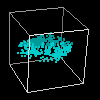
Astronomy and Astrophysics
Glossary
Home
Links
Glossary
Monday
Tuesday
Wednesday
Thursday
Friday
- star: A round dense ball of hydrogen, in the process of fusion.
- universe: Everything.
- planet: A large rocky body formed by the gradual accretion of smaller rocky bodies orbiting around a star.
- sun: Our sun is a star, and is by far the largest and most massive object in the solar system.
- moon: A planetary satellite. Moons are dense rocky bodies that orbit planets.
- asteroid: A solar system object. An asteroid is a dense rocky body that orbits the sun, most are founf in an orbit in the Asteroid belt, halfway between Mars and Jupiter.
- comet: A solar system object. A comet is a loose compaction of ice and dust which orbits the Sun. Comets are usually found either in the Kuiper belt (around the orbit of Pluto) or the Oort cloud (the outer edges of the solar system, up to 1000 times as far as Pluto from the sun).
- astronomical unit (AU): A measure of distance, the astronomical unit is the distance between the Earth and the Sun.
- parallax: when the observer moves, objects that are closer appear to shift from side to side. This is called parallax, and it can be used to determine the distance to nearby stars.